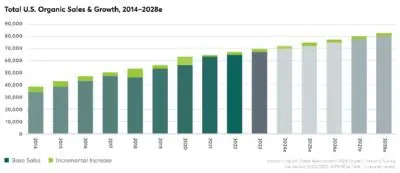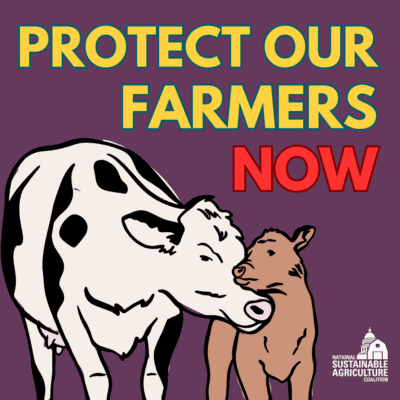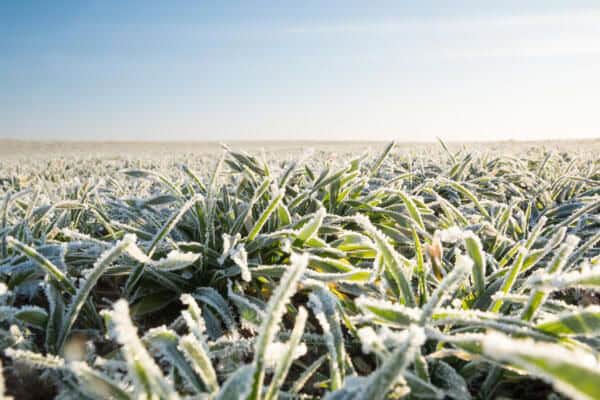Gordon’s Policy Corner has a guest author this month! This blog post was written by our Fall 2024 Policy and Communications Intern, Jazea Kalea Smith.
Being a Religious Studies major and an Oceanography minor, one might say that I’m a bit of an untraditional intern for OFRF. Besides a passion for being outdoors and a dream of running off to become a farmer I’ve harbored since I was 14, I generally live and work on the ocean side of conservation and food production. I’m happy to report that my time with OFRF, although brief, has ignited a flame in me to broaden my understanding of food systems both on land and at sea within my future academic and professional career. However, today I write from that foundational marine science perspective as we explore just how detrimental conventional agricultural runoff is for ocean health and resource viability.

A shrimp boat drifts along the North Carolina shoreline.
This article seeks to provide context for why the continued use of conventional farming practices are unsustainable for the health of marine ecosystems, with an emphasis on fisheries. We first define what runoff is, and what its impacts are on water quality. Next, marine and estuarine systems impacts are described in depth, including the largest “dead zone” in the U.S. Then, the impacts of pesticide, herbicide, and bacterial contamination on marine life, human illness, and decrease in support for shellfish aquaculture operations. After focusing on the widespread effects, a background on the regulatory bodies and monitoring projects related to agricultural operations is provided, as well as a brief exploration of the EPA’s role. In conclusion, this blog highlights how and why organic practices inherently improve upon this crucial issue.
What is runoff?
Agricultural “runoff,” a type of nonpoint source pollution, refers to irrigation and rainfall originating on agricultural land that makes its way outside of the bounds of a farm site. This runoff can carry nutrients, bacteria from livestock manure, and other chemicals from poorly managed land into downstream lakes, rivers, estuaries, and coastal areas. Survey efforts, including the National Water Quality Assessment, have demonstrated that runoff from agricultural operations is the leading source of impacted water quality in the United States. Both artificial chemicals and unnatural levels of naturally occurring chemical compounds infiltrate our water supplies and can lead to devastating human health consequences. Although more research is urgently needed, there is a documented correlation between pediatric cancer rates and high levels of nitrate and the herbicide Atrazine in drinking water. Approximately 13 million households in this country are supplied with water by private wells, which are at a higher risk of contamination than public systems often are. Furthermore, runoff destabilizes soil integrity, causing destructive erosion and decreasing soil compositional health.

U.S. Geological Survey
What are the effects of runoff on marine and estuarine systems?
Twenty-one percent of the coastal waters in the U.S. contain excess levels of nutrients, and more than 80% of marine ecosystem pollution originates on land. Nitrogen and phosphorus are the primary nutrients contained in runoff, and the result of excess concentrations in marine and estuarine environments is hypoxia: oxygen concentrations of less than 2 milligrams per liter. Affected areas are commonly referred to as “dead zones,” because the overproduction and subsequent decomposition of algae decreases dissolved oxygen levels to the point where very few organisms can survive. Fish that have been subjected to hypoxia exposure additionally demonstrate abnormal behavior, lower reproduction and growth rates, a shift in the dynamics of the food web, and a decrease of overall resilience. The loss of planktonic fish eggs to hypoxic waters impacts vulnerable population numbers, often previously devastated by overfishing practices. A highly relevant example of this reaction is the Chesapeake Bay, the largest, and one of the most polluted, estuaries in the United States. The historical average (based on conditions between 1985-2023) of hypoxic waters in the Bay is 2.3-7.9 [km3]. To put this area into perspective, 1 km3 of water is the equivalent of 400,000 Olympic swimming pools! Agricultural runoff is the number one source of excess nitrogen flow into the Chesapeake, contributing 48% of the total load.
What is a major U.S. example of a “dead zone” and its widespread impacts?
The largest dead zone in the United States runs along the coast of eastern Texas and all of Louisiana, with a staggering 6,705 square miles of hypoxic waters recorded in the summer of 2024. Runoff from farms throughout the Mississippi-Atchafalaya River Basin, which comprises 31 states and two Canadian provinces, empties into the Gulf more than 70% of the excess nitrogen load and more than 80% of the phosphorus load. Not only does runoff play a role in impacting healthy waters and biodiversity, but it’s estimated that the Gulf of Mexico dead zone has led to economic losses of approximately $2.4 billion annually since 1980. These losses largely stem from the increasing lack of viability of shrimp fisheries, most prominently brown shrimp, as well as the Atlantic croaker and oyster fisheries. Economic hardship for commercial fishers paired with deprivation of Cultural ecosystem services (CES), the intangible benefits garnered from living and working with industries dependent on interaction with ecosystems, have the potential to devastate livelihoods. These services are understudied yet often indispensable to the health of the affected communities.
How does pesticide, herbicide, and bacterial contamination affect marine life?

In addition to the widespread effects of fertilizer over-application, the USGS estimates that 500,000 tons of pesticides are applied to U.S. crop fields annually. Chlorpyrifos are a widely applied organophosphate pesticide that is highly toxic to most marine and freshwater organisms. Further, the most commonly used herbicide in conventional agriculture worldwide is glyphosate, which has been directly linked to alterations in foraging, predator evasion, and mating behavior in aquatic species. These changes compromise the ability of aquatic organisms to survive and reproduce, and a rise in ocean temperatures correlated with global climate change also poses significant future risk—under higher temperatures, static concentrations of glyphosate-based formulations’ and chlorpyrifos’ toxicity and lethal potential for marine life grows.
Finally, research shows that bacterial contamination derived from the application of uncomposted, raw manure slurry as a fertilizer and concentrated animal feeding operations (CAFOs) pose a risk to marine life and aquatic organisms broadly. Manure is generally considered an organic fertilizer, depending on its source, and is used on certified organic farms in conjunction with other soil conservation techniques designed to minimize runoff and stabilize soil. It’s been determined that 30% of surface-applied manure on conventionally cultivated corn fields (the most planted U.S. crop by acreage) is never incorporated, resulting in lower nutrient retention and economic losses. 16.3% of corn fields are treated with manure fertilizer. Incorporation of manure into the soil, a more commonly used organic farming practice, has been examined in recent studies and was shown to decrease runoff potential, preventing manure-borne pathogens such as Salmonella, E. coli, and Vibrio from entering greater watershed areas.
How can contamination cause human illness and hurt sustainable aquaculture efforts?
Exposure to these pathogens in marine bivalves (planktonic filter-feeders) can increase the hazards of human consumption of raw shellfish, potentially reducing demand for farmed shellfish. Oyster, clam, and mussel farms are being adopted as a solution to eutrophication (high nutrient influx and subsequent algal blooms), so public acceptance and confidence in farmed shellfish is more critical than ever. Regarding fisheries broadly, bioaccumulation, the process by which chemicals such as those in pesticides and herbicides build up in organisms when they cannot be metabolized or excreted faster than they are taken in, can lead to obesity, cancer, endocrine disruption, and more in human consumers.
How is agricultural runoff monitored and regulated in the U.S.?
The Environmental Protection Agency (EPA) is the primary federal agency that facilitates water quality monitoring and protection, and provides funding for numerous long-term research projects. The EPA collaborates with and supports many federal, state, and regional departments that support water quality assessments. At the federal level, highly involved agencies include the United States Geological Survey (facilitator of the National Water Quality Program), the National Oceanic and Atmospheric Administration’s Office for Coastal Management, and the United States Department of Agriculture’s Natural Resource Conservation Service (USDA NRCS).
Section 319 of the Clean Water Act (CWA) created the Nonpoint Source Management Program, providing grants to U.S. states and territories for the purpose of increasing regional involvement in runoff mitigation. $178 million was appropriated in 2022 for this program, funneled towards resources such as public educational programing, technical and financial aid, demonstration projects, and monitoring. 22,500 watershed projects have been funded under Section 319 since 2000, successfully improving water quality across the country. Additionally, the National Nonpoint Source Monitoring Program (NNPSMP) was established under Section 319, and is intended to provide proof of the viability of nonpoint source control methods.
What is the “Total Maximum Daily Load” and how is it achieved?
Total Maximum Daily Load (TMDL) limits are required by the CWA in impaired watersheds, subject to National Pollutant Discharge Elimination System regulations (which specifically address point source pollution), set by each state, and confirmed by the EPA. TMDLs must factor in seasonal variability and build in a “margin of safety.” They are designed to ensure that waterways meet water quality standards for toxic pollutants. In 2014, the Chesapeake Bay TMDL was set at a limit of 12.5 million pounds of phosphorus, 185.9 million pounds of nitrogen, and 6.45 billion pounds of sediment annually entering the estuary. In comparison to 2009, these limits represent a 25% nitrogen decrease, 24% phosphorus decrease, and 20% sediment influx decrease. To reach these reductions, nutrient management planning is a mandatory step in the large farm permitting process in many states, including Maryland, Vermont, California, and Washington. In order for production to legally commence on any operation in these states, a plan with a detailed layout of the status of the land (including soil tests) and records of nutrient application timing must annually be submitted to the state.
Research has found that there are Best Management Practices (BMPs) that can mitigate pollution, like cover cropping and forest buffers, and are sometimes prescribed by state agencies and regional organizations to reach TMDL restrictions. Organic practices oftentimes align with BMPs, and are being increasingly adopted by farmers, largely with the assistance of incentive programs; 39% of farmland in Pennsylvania’s Chesapeake watershed implemented cover cropping between 2016 and 2021, versus 5% of the broader U.S. Runoff forecasts have also been identified as a crucial aid to farming operations, allowing farmers to make informed decisions about when to apply inputs to avoid storm events. Check out these interactive maps from NOAA on runoff risk in 5 U.S. states.
Why do the harmful effects of runoff continue to increase?
NOAA has set a goal to reduce the 5-year average extent of the Gulf of Mexico dead zone down to 1,900 square miles by 2035, and to bring nutrient runoff down 20% by 2025. However, despite successful efforts to increase compliance, the levels of runoff have not decreased significantly in the wake of the setting of these deadlines; in contrast, between 2012 and 2022, the underground drainage tube network has increased by 9.5% and hog production increased 12%. Between 2016 and 2020, combined synthetic fertilizer sales in Iowa, Wisconsin, Illinois, and Minnesota increased by 10.6%. From the climate change perspective, spring storm frequency in the Midwest is climbing, allowing less time for pesticide and fertilizer application to absorb before entering drainage pathways.
NOAA’s Coastal Nonpoint Pollution Control Program is a joint effort with the EPA to support states with guidance on management practices for addressing runoff from five nonpoint sources, of which agriculture is one. Management measures to be applied by states (required under the Coastal Zone Act Reauthorization Amendments of 1990) include erosion prevention tactics such as conservation tillage. The application of pesticides that are the “most environmentally benign” and 3-year cycle nutrient management plans are additional mandatory measures. Cover cropping, green manure incorporation, and crop rotations are non-required but recommended management practices under the CZARA. As the aforementioned research tells us, the most prevalent pesticides in the U.S. today carry a wide variety of environmental and human health dangers. Runoff risk is on the rise with increasing toxicity of many of the commonly found chemicals, even if overall American usage may be declining.
Enforcement success has been plagued by the simple fact that many of these departments are spread thin. Within the Chesapeake Bay watershed, the Maryland Department of the Environment only employed three people who were assigned to conduct in-person inspections at poultry operations. Nutrient management plans of 5,000 farms in the state were monitored by nine Maryland Department of Agriculture employees. This is seemingly the case for many agencies throughout the country. Given the sheer number of farms and CAFOs in the U.S., enforcement can be seen as a challenging logistical endeavor and largely the product of limited departmental funding.
How does organic agriculture support marine conservation and ecosystem health?
Ingrained within the organic farming methodology are many courses of action for reducing agricultural runoff through rebuilding soil health. Practices that are in line with organic systems such as crop rotation and cover cropping have been shown to lead to increased nitrogen availability and soil stabilization. No-till and conservation till methods protect soil integrity and are associated with lower risks of runoff. However, they are a major challenge for organic farmers. In some cases, runoff risk may be lessened on organic farms still using tillage when combined with cover cropping and compost application, by growing active soil organic carbon concentrations. Although organic farmers can utilize nutrient-dense inputs like chicken litter or composted manure to maximize crop yield and quality of product, standard practices allow for operations to infrequently rely on fertilizers alone. Use of “green manure,” often legume plants that are grown and incorporated into fields, can significantly increase nitrogen availability for the primary crop.
The most fundamental practice associated with organic farming is a clear solution to runoff-caused marine ecosystem damage: the strict prohibition of chemical pesticide and herbicide application. The evidence that these chemicals are invading human and animal communities is strong, and the correlation between exposure to many of the commonly utilized conventional products and illness is well-studied. Reframing this issue as an environmental injustice is critically important to fully convey the human impacts of chemical usage: BIPOC (Black, Indigenous, and People of Color) communities are disproportionately impacted by exposure to environmental pollutants. Organic systems are more aligned with TEK (Traditional Ecological Knowledge) by emphasizing comprehensive understanding of the landscape and natural processes that can be utilized for sustainable production.
Organic farming is a sustainable farming method that is constantly evolving and improving, and is consistent with the goals of decreasing runoff and protecting both marine environments and human communities. Because we face these issues alongside a rapidly changing climate, acting as stewards of ocean biodiversity is more essential than ever; advocacy for organic agriculture can truly be interpreted as a serious climate and coastal pollution mitigation tactic.
If you want to learn more about the impact of agricultural runoff on the two largest estuaries in the United States, watch this PBS Frontline documentary on coastal pollution in the Puget Sound and Chesapeake Bay.
If you want to get active in helping OFRF advocate for expanded technical and financial services for organic producers, and the research programs that inform them, please reach out!
As Gordon says, eat well and breathe deep,
Jazea




 Hi! I’m Vinnie Trometter, the new policy fellow at OFRF. I want to take a moment to introduce myself: Prior to coming to OFRF, I worked in policy fields related to pesticide safeguards, reference prices, and crop insurance. I also have a background in the commodities trade and have worked in international trade organizations around the world. I have also had multiple op-eds about agriculture and the steel industry published in outlets like the Chicago Tribune, Pittsburgh Post-Gazette, and the Boston Herald. It seems only fitting then that my first blog post for OFRF be about the elephant in the room, tariffs.
Hi! I’m Vinnie Trometter, the new policy fellow at OFRF. I want to take a moment to introduce myself: Prior to coming to OFRF, I worked in policy fields related to pesticide safeguards, reference prices, and crop insurance. I also have a background in the commodities trade and have worked in international trade organizations around the world. I have also had multiple op-eds about agriculture and the steel industry published in outlets like the Chicago Tribune, Pittsburgh Post-Gazette, and the Boston Herald. It seems only fitting then that my first blog post for OFRF be about the elephant in the room, tariffs. Prior to the trade war, demand for organics was poised to grow significantly. According to the Organic Trade Association (OTA)’s 2024 Organic Survey, sales in organic products were projected to grow by 28% through 2025 compared to 2021 numbers. This trend is consistent with a recent 2025 Economic Research Service (ERS)
Prior to the trade war, demand for organics was poised to grow significantly. According to the Organic Trade Association (OTA)’s 2024 Organic Survey, sales in organic products were projected to grow by 28% through 2025 compared to 2021 numbers. This trend is consistent with a recent 2025 Economic Research Service (ERS) 









